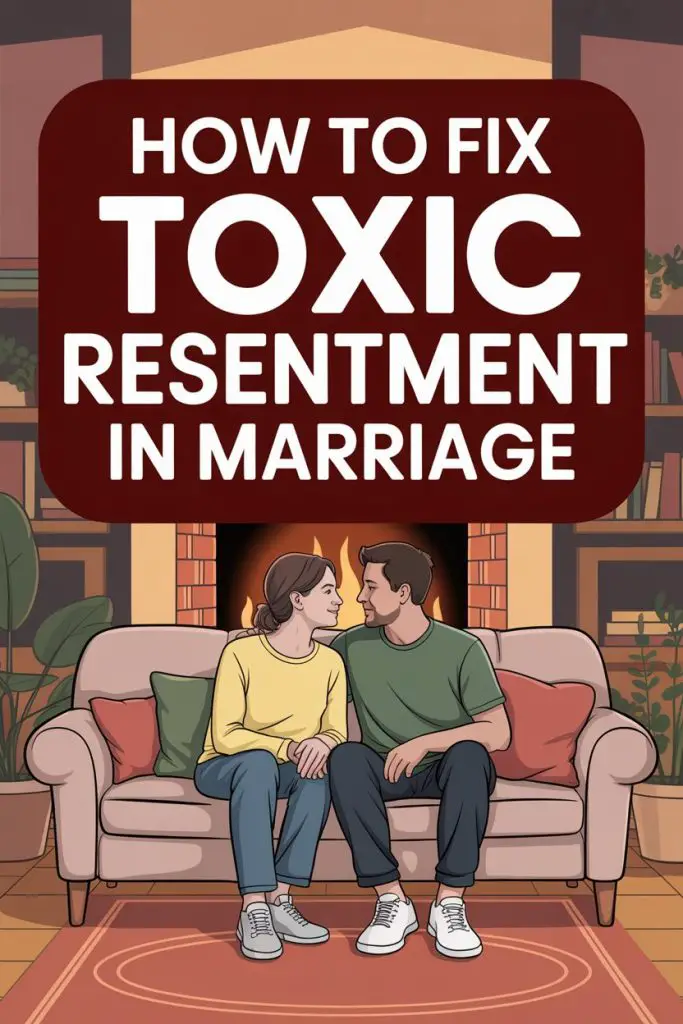Ever found yourself arguing about the same thing for the 200th time, convinced your spouse is auditioning for an Olympic gold in selective memory?
If you’ve started counting eye-rolls as cardio, there’s a good chance resentment has quietly moved in, rearranged the furniture, and changed the Wi-Fi password.
The good news? That unwelcome houseguest doesn’t have to take up permanent residence.
Spotting the Not-So-Obvious Resentment
It’s easy to picture resentment as a shouting match over who left socks on the floor. Truth is, it’s sneakier than that.
It’s the silent dinner table, the sigh before a reply, the “nothing’s wrong” said with enough tension to power a small city.
Maybe it’s a mental tally of every slight, a little more caffeine in your morning mug to brace yourself for another day of walking on eggshells.
That simmering irritation? It’s not just about dirty dishes. It’s about needs not being met, invisible scorekeeping, and feeling like you’re both living separate lives under the same roof.
Why Resentment Feels Immortal
Left unchecked, resentment has the persistence of a toddler at bedtime. It grows roots—fed by unspoken hurts, chronic misunderstandings, and disappointments swept under the rug for the sake of “peace.”
Before long, it morphs into contempt, and nothing kills intimacy faster than a regular diet of bitterness.
No, you can’t just “get over it.” If it was that easy, you wouldn’t be reading this, and I wouldn’t have a job.
The Myth of the Mind Reader
Guessing games are for toddlers and reality TV, not marriages. Yet so many couples cling to the hope their spouse will just “know” what’s wrong. Spoiler: they won’t.
Even the most loving partner can’t decode a sigh or translate silence into actionable feedback.
Clarity isn’t just kind—it’s crucial. If you need help, want more affection, or are still holding a grudge from Christmas 2017, say it. Use small words, gentle tone, and preferably not mid-argument or when your partner is hangry.
Trade the Blame Game for Honesty
Resentment loves a good round of finger-pointing. Each keeps score, rehearsing old grievances like they’re headlining Glastonbury.
Blame is seductive: it’s easier to tally their faults than admit your own hurt or vulnerability.
Try this: when that familiar urge to blame bubbles up, pause. Name your feeling. “I feel unappreciated when you scroll through your phone at dinner” lands better than, “You never listen to me.”
One invites connection, the other invites World War III.
Channel Your Inner Detective, Not Prosecutor
Curiosity is the antidote to resentment’s certainty.
Instead of assuming your spouse is out to get you (unless you married a Bond villain), try asking what’s really going on with them. Maybe their own stress is turning them into a distant roommate.
Questions like, “Have I done anything lately that bothered you?” or “How are you really feeling about us?” are more disarming than a barrage of accusations.
The aim isn’t to interrogate, but to invite open, honest dialogue—preferably not during the season finale of your favorite show.
Small Gestures, Big Reset
Resentment tells you to wait for the other person to make the first move. Generosity says, “What the hell, I’ll go first.”
Tiny acts of kindness—a coffee in bed, a compliment, letting them watch their trash TV in peace—can break the cycle of bitterness.
No, it won’t fix everything overnight. But it does build goodwill, softening the sharp edges and reminding you both of the person you actually married, under all the laundry and life admin.
Boundaries: Not Just for Bad Reality TV
If your marriage feels like a 24/7 job with no overtime pay, boundaries have probably left the chat. Resentment thrives when one (or both) of you is consistently over-giving or under-acknowledged.
Healthy boundaries sound like, “I need some quiet time after work,” or “Let’s alternate school runs.” Guilt is normal, but not a reason to keep saying yes when you mean no.
Healthy marriages have space for two whole, slightly flawed people—not one martyr and one mind-reader.
Apologies Without Buts or Backflips
An apology paired with a justification is just a fancy way of saying, “I’m not really sorry.” Want resentment to pack its bags? Offer real apologies.
That means: “I’m sorry I snapped at you. I was wrong.” Full stop. Not, “I’m sorry, but you were being super annoying.”
If apologies are rarer than unicorns in your home, maybe it’s time to normalize them. Everyone messes up.
Marriage isn’t about perfection; it’s about showing up, facing the music, and learning the two-step together.
Repair Rituals (No Crystals Required)
Couples who survive the long haul know how to repair—fast. Think of it like hitting the reset button after a glitch. A quick hug, a text saying “we okay?” or a cup of tea and a sheepish grin can work wonders.
The goal isn’t to avoid all conflict (good luck with that), but to clean up the emotional mess afterward. Every repair, no matter how small, tells your spouse: “We’re in this together—even when we’re at our worst.”
When DIY Isn’t Cutting It
Sometimes, resentment digs in deeper than a dentist on payday. If you’re trying and it’s still Groundhog Day in your arguments, roping in a couples therapist isn’t a sign of failure.
Think of it as an emotional tune-up, not a last resort.
A good therapist won’t take sides or hand out gold stars. They’ll help both of you untangle the mess, deal with old wounds, and build better ways to connect.
If your spouse won’t go? Go anyway. Even one healthy partner can shift the dance.
Forgiveness—Not the Hallmark Kind
Forgiveness gets a bad rap as rolling over and forgetting everything. Real forgiveness is messier. It’s choosing—sometimes daily—not to weaponize old wounds in new arguments.
It’s letting go of the fantasy your spouse will ever grasp just how annoying that thing they do really is.
Forgiveness doesn’t mean trust is instantly restored, or that you’ll never get mad again. It’s a slow, stubborn act of hope: “We can get through this.
We can do better. We can remember why we started.”
When Resentment Starts to Melt
Those small shifts—a genuine apology, a curious question, a cup of tea in bed—aren’t magic spells, but they do add up. The more you practice vulnerability, boundaries, and repair, the less room resentment has to grow.
One day, you might notice the dinner table isn’t so silent. You’re laughing at the same old in-jokes again. Maybe, just maybe, you’re even grateful to have someone worth arguing with.
The Long Game
Marriage isn’t about banishing resentment forever.
It’s about catching it before it takes over the whole show. It’s about making the brave, everyday choice to show up, own your stuff, and risk connection—even when it’s awkward or hard.
If you’re here, reading all this, you care enough to try. That’s half the battle.
Now, time to take that first, gloriously imperfect step—no Olympic training required.


